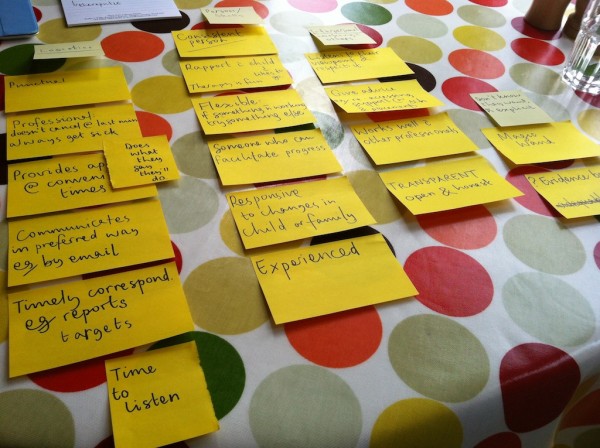
I’ve been thinking about how parents choose a therapist for their child (I’ve recently set up my private practice). What are they looking for? What do they want? I used feedback I’ve received from parents to make a list, then arranged my ideas into themes.
First there are ‘logistical’ factors. Parents want an SLT who:
- is punctual,
- is professional – doesn’t cancel appointments at the last minute,
- is reliable – does what she says she’ll do,
- gives appointments at a convenient time,
- communicates in a convenient way, for example by email,
- completes reports in a reasonable time frame,
- has time to listen to them.
Next there are ‘therapist’ factors. Parents want someone who:
- can build rapport with their child, so therapy is fun & their child likes going,
- can facilitate progress, so their child develops new skills,
- is flexible, if something isn’t working she’ll try a different approach,
- is responsive to changes in the child or family,
- is experienced,
- is consistent (this is a big one) they want the same therapist, not a different person every block or visit.
Interpersonal factors are also important. Parents value therapists who:
- listen to their views and respect them,
- believe in their child’s ability to make progress and offer hope,
- can give advice and support around wider issues such as school placements,
- can work well with the other professionals their child sees,
- can admit when they don’t know something and ask a colleague,
- are transparent, with an open, honest, straightforward attitude.
A magic wand and the evidence base
I thought of two more things that don’t really fit in above: the magic wand and the evidence base. Some parents want to find an SLT with a magic wand, someone who can simply make their child’s difficulty disappear. If you find one, let me know, I’d love to interview him or her for my podcast!
Finally, there’s evidence based therapy. I’m not sure how much of factor the evidence base is for parents. Although I’ve never been asked to support my therapy plan with research papers, I have been asked: do you think this will work, how has this approach worked with other children, and which approach will have the quickest result? So some parents are evaluating different therapy options, it’s really encouraging.
When I look over this list, I’m struck by how many of these depend on a therapist having enough time. Perhaps that’s the key, parents want a therapist who they feel, has time for them.
What have I missed? SLTs, what do your families tell you they’re happy with and what do they complain about? Parents, what is most important to you when you’re looking for a therapist? I’d love to hear from you!

Hi, I’ve had extremely positive feedback about therapy goals. Parents appreciate knowing and SEEING the therapy plan in more digestible pieces. They’ve often reported that it helps them feel like there’s an end point to their child’s difficulties. Some have described this as “a light at the end of the tunnel” for a seemingly never ending process. Even though you might know where you’re heading, it’s often a good idea to write this down and give a copy to the parent.
Thanks for you’re blog, always interesting!
Cheers, Julia Orsini
Director, Kids Spot
Hi, I am a parent and I would LOVE a therapist with a magic wand, please! On the realistic side though, I like to be educated and informed as much as possible about the what my daughter is working on so I know how best to help her continue with stuff between sessions with our SaLT. Relevant experience is also important, as is effective communication – knowing what we are doing and why and how. I concur with the point about being resourceful – if progress is not good why and what can be done?
I do think Therapeutic Alliance is so important – I think the right fit is important for children who may respond better to different personalities, styles and techniques and feel blessed to have a set up now that is helping Mia make good progress. I would say she has made more progress in the last few months, than in her whole life!
Pingback: What to Know when Talking to Your Child with a Language Disorder - Speech Buddy - Modeling, Rate Reduction, Visual Cues and Support Strategies